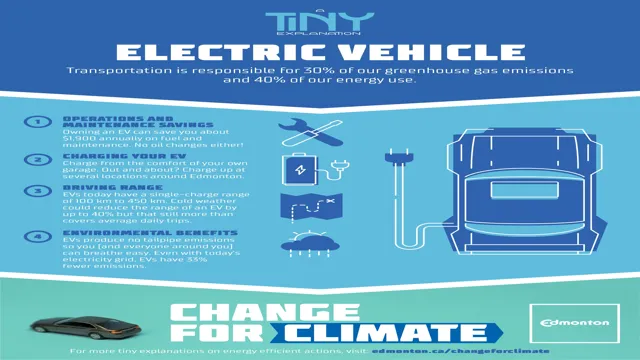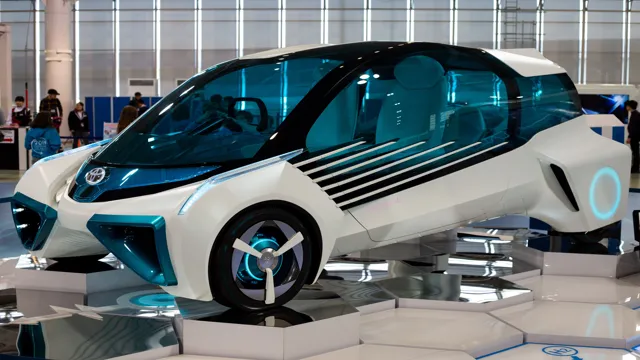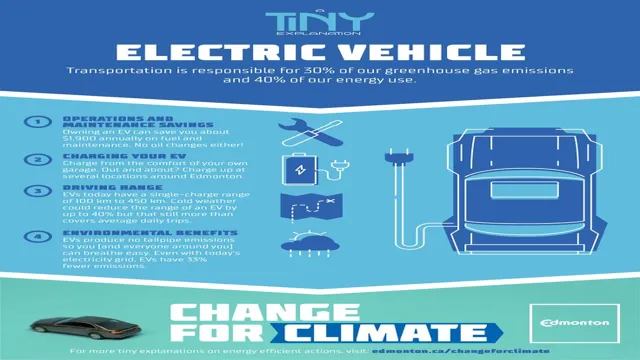Eco-Friendly and Efficient: Exploring the Environmental Benefits of Electric Cars
Every day, we are bombarded by images and stories of the negative impact that human behavior has on the environment. From melting polar ice caps to plastic waste swirling in the ocean, it’s easy to feel overwhelmed by the scale of our planet’s ecological problems. But there is good news.
There are also countless examples of people taking action to protect the planet and its resources. And the benefits of doing so are numerous and far-reaching. In this blog post, we’ll explore the environmental benefits of making conscious choices and changes in our daily lives.
By the end, you’ll likely be motivated to make a few small changes in your own life as well.
Reduced Emissions
Electric cars are known for their ability to significantly reduce harmful emissions into the environment, making them an eco-friendly alternative to traditional gasoline-powered vehicles. When compared to gas-powered cars, electric vehicles have far less emissions and a smaller carbon footprint. These cars run on electricity, which means they emit zero emissions from the tailpipe.
However, it is important to note that emissions may be produced during the generation of electricity required to charge the car’s battery. But even taking this into account, electric cars still produce fewer emissions than traditional cars. In fact, electric cars emit up to 50% fewer greenhouse gases and other pollutants over their lifetime.
This makes electric cars a great choice for those who are looking to reduce their carbon footprint and contribute to a cleaner, healthier planet.
Electric cars produce zero tailpipe emissions
Electric cars are paving the way for a greener automotive industry by producing zero tailpipe emissions. This means that they don’t emit pollutants such as carbon dioxide, nitrogen oxides, and other harmful substances that contribute to air pollution. As we become more aware of the effects of climate change, reducing emissions from transportation has become a top priority.
Electric cars offer a solution by using clean energy sources such as renewable energy and reducing our dependence on fossil fuels, which are the largest contributor to greenhouse gas emissions. Moreover, with advancements in technology, electric cars are no longer limited by their range or lack of infrastructure. With the installation of more charging stations around the world, electric cars are becoming a viable option for many drivers who want to reduce their carbon footprint.
By choosing electric cars, we can all contribute to reducing emissions and making the world a cleaner and healthier place to live.

Less reliance on fossil fuels
Reduced Emissions As we move towards a more sustainable future, the need for reducing our reliance on fossil fuels becomes more pressing. Not only are they a finite resource, but their extraction and usage are major contributors to greenhouse gas emissions. By transitioning to cleaner energy sources like renewable energy, we can drastically reduce our carbon footprint and curb the adverse effects of climate change.
Additionally, measures such as energy efficiency improvements, carbon capture and storage, and the use of electric vehicles can also contribute to cutting down emissions. It’s important to recognize that reducing emissions isn’t just an environmental responsibility, but it also presents economic opportunities and benefits. As we shift towards a greener economy, we can create new jobs and industries, boost innovation, and improve public health.
It’s clear that reducing emissions is a win-win situation for both people and the planet.
Energy Efficiency
One of the main environmental benefits of electric cars is their energy efficiency. Unlike traditional gasoline-powered vehicles, electric cars convert energy from the grid into mechanical energy to power their electric motors. This process is much more efficient, as it involves fewer energy losses than the alternative combustion process.
Additionally, the production of electricity for electric cars is becoming increasingly renewable, as more wind, solar, and hydro power sources are being used to generate electricity. This means that electric cars have the potential to significantly reduce greenhouse gas emissions and air pollution because they have a much smaller carbon footprint than conventional cars. With its energy efficiency and decreasing reliance on fossil fuels, the use of electric cars could be a key component of creating a more sustainable future.
Electric cars are more energy efficient than gasoline cars
Electric vehicles or EVs are much more energy-efficient than their gasoline counterparts. This is because EVs generate energy from electricity stored in batteries, which is much more efficient than burning gasoline in an internal combustion engine. According to studies, electric cars can convert over 80% of their stored energy into movement, while traditional gasoline cars can only convert around 15% to 20% of their fuel energy into motion.
That means that electric cars can travel further on a single unit of energy while producing less carbon emissions and saving money on fuel costs. Additionally, regenerative braking technology used in many EVs enables them to recharge their batteries while slowing down or coming to a stop, further increasing energy efficiency. All in all, electric cars provide a sustainable and energy-efficient alternative to gasoline cars, which can have a significant impact on reducing our carbon footprint and mitigating the effects of climate change.
Less energy wasted in the form of heat
Energy efficiency is a crucial aspect of any modern device or appliance. With the growing concerns about climate change, we cannot afford to waste energy anymore. Energy efficiency measures are designed to decrease the amount of energy wasted in the form of heat.
This means that we can get more work done with the same amount of energy, while at the same time reducing our carbon footprint. By using energy-efficient devices at home, you can save significant amounts of money on your utility bills while also contributing to a sustainable future. When appliances are not energy-efficient, they consume more energy than they need to, and the excess amount is released as heat, which is wasted energy.
This is especially true for devices like refrigerators, air conditioners, heaters, and other household appliances that tend to consume a lot of energy. If you use an energy-efficient appliance instead, it will use less energy to perform the same function, meaning that less energy will be wasted in the form of heat. Overall, energy efficiency is a small but significant step towards a sustainable future, and by using energy-efficient devices, we can make a real difference.
Regenerative braking helps recharge the battery while reducing energy waste
Regenerative braking is one of the most significant advancements in automotive technology that is helping to reduce energy waste. This innovative feature is designed to recover kinetic energy that is otherwise lost during braking, which can then be used to recharge the battery. By converting the vehicle’s kinetic energy into electrical energy, regenerative braking increases the overall efficiency of an electric vehicle and helps to reduce the amount of energy consumed.
This technology helps to extend the battery’s range, making it an ideal addition for electric drivers who want to travel longer distances without having to recharge too often. With regenerative braking, it’s easy to see how every little bit counts, and how simple changes to a vehicle’s design can make a significant impact on energy consumption and sustainability. It’s clear that regenerative braking is an essential technology that is helping us to create a more efficient, sustainable, and eco-friendly future.
Reduced Pollution
One of the greatest environmental benefits of using electric cars is reduced pollution. Traditional gasoline-powered vehicles emit toxic gases into the atmosphere that are harmful to both the environment and human health. Electric cars, on the other hand, produce no emissions and reduce the overall amount of pollutants in the air.
This means that electric cars are helping to mitigate the effects of global warming, reduce smog and other forms of air pollution, and make our cities and towns cleaner and healthier places to live. Plus, because electric cars don’t require gasoline, they reduce our dependence on foreign oil and help to make our country more energy independent. So if you’re concerned about the health of our planet, electric cars are a great way to reduce your carbon footprint and help create a cleaner, more sustainable future.
Electric cars reduce air pollution in urban areas
Electric cars provide a significant reduction in air pollution, particularly in dense urban areas. As more cities aim to reduce their carbon footprint and improve air quality, the demand for electric vehicles continues to surge. The combustion engine has been one of the leading factors of pollution in the world, but electric cars provide a greener and sustainable option.
These vehicles emit no carbon or smog, and the lack of exhaust fumes reduces harmful pollutants like nitrogen oxides. By opting for an electric car, not only are you reducing your carbon footprint, but you’re also contributing to a cleaner, greener future for our planet. Moreover, electric cars are not only better for the environment – they’re cheaper to run and maintain, they have a lower cost of ownership, and their batteries can be charged from renewable energy sources such as wind and solar.
So, why not make the switch to electric today and be part of the solution to a healthier, more sustainable world?
Electric cars reduce noise pollution
Electric cars are known for being environmentally friendly, but did you know that they also contribute to reducing noise pollution? Electric cars operate silently, as they run on batteries, without the need for combustion engines, which are noisy and create a lot of pollution. This means that electric cars can reduce noise pollution in urban areas, which is a significant benefit, particularly for those who live in areas with a high volume of traffic. In addition, electric vehicles do not produce any exhaust fumes, which means that they also reduce the level of pollution in the air.
This makes electric cars a fantastic choice for those who want to help reduce pollution and noise levels in their community, while also enjoying a more eco-friendly driving experience.
Climate Change Mitigation
When it comes to climate change mitigation, electric cars have become a popular option because of the numerous environmental benefits they offer. By running on electricity instead of fossil fuels, they produce significantly less air pollution and greenhouse gas emissions. This means that electric cars help to improve air quality, reduce smog and decrease the amount of carbon dioxide in the atmosphere, which is one of the main drivers of climate change.
Additionally, electric cars are much more energy efficient than traditional gasoline-powered vehicles and have lower operating costs, making them a more sustainable option for individuals and businesses. While there are still challenges to overcome, such as the production of clean energy to power electric cars, they are undoubtedly a step in the right direction towards a cleaner and more sustainable future.
Conclusion
To put it simply, electric cars are not only efficient and cost-effective, but they are also contributors to a cleaner and healthier environment. With zero emissions and reduced dependency on fossil fuels, electric cars are paving the way for a brighter, greener future. So, if you want to save the planet while zooming past traffic, electric cars are definitely the way to go.
After all, why sacrifice style and comfort when the environment can benefit from it?”
FAQs
How do electric cars benefit the environment?
Electric cars reduce harmful emissions by not using fossil fuels that emit pollutants into the air. They also help decrease dependence on oil and have a lower carbon footprint.
Are there any other environmental benefits of electric cars besides reducing emissions?
Yes, electric cars also contribute to a more sustainable future by promoting renewable energy sources, such as solar and wind power, which are used to charge the cars.
Can electric cars help reduce noise pollution?
Yes, electric cars are much quieter than traditional gasoline vehicles and can help reduce noise pollution in urban areas.
How does the manufacturing of electric cars impact the environment?
While the production of electric cars may require some materials that have an environmental impact, such as lithium for batteries, once in use, they have a much lower impact compared to traditional fossil fuel vehicles. Efforts are also being made to improve the sustainability of electric car production.





